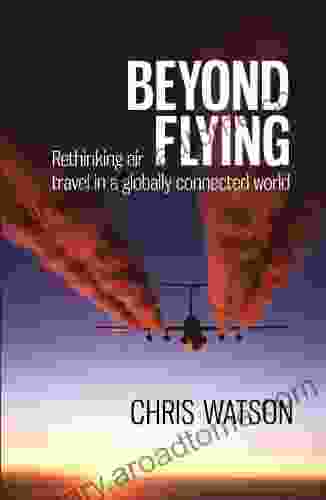Rethinking Air Travel in a Globally Connected World

4.8 out of 5
| Language | : | English |
| File size | : | 834 KB |
| Text-to-Speech | : | Enabled |
| Screen Reader | : | Supported |
| Enhanced typesetting | : | Enabled |
| Word Wise | : | Enabled |
| Print length | : | 209 pages |
Air travel has become an integral part of our lives. It connects us with people and places, enables global trade, and drives economic growth. However, the aviation industry is also a major contributor to climate change and other environmental problems.
As the world becomes increasingly interconnected, we need to rethink the way we travel by air. We need to find ways to make air travel more sustainable, more efficient, and more accessible to everyone. In this comprehensive guide, we will explore the future of air travel in a globally connected world.
The environmental impact of air travel
Air travel is a major contributor to climate change. The aviation industry produces about 2% of global greenhouse gas emissions. These emissions come from the burning of jet fuel, which releases carbon dioxide, nitrogen oxides, and other pollutants into the atmosphere.
In addition to climate change, air travel also contributes to other environmental problems, such as air pollution and noise pollution. Air pollution from aircraft can cause respiratory problems and other health issues. Noise pollution from aircraft can disrupt sleep and make it difficult to concentrate.
The future of sustainable air travel
The aviation industry is committed to reducing its environmental impact. Airlines are investing in new technologies, such as electric and hybrid aircraft, that will reduce emissions. They are also working to improve fuel efficiency and to operate their flights more efficiently.
In addition to technological solutions, the aviation industry is also exploring operational changes that could reduce emissions. For example, airlines are considering flying more direct routes and using more efficient flight paths. They are also working with air traffic controllers to reduce congestion and improve the flow of air traffic.
The future of sustainable air travel is bright. The aviation industry is committed to reducing its environmental impact, and it is investing in the technologies and operational changes that will make it possible.
The impact of globalization on air travel
Globalization has had a significant impact on air travel. As the world has become more interconnected, the demand for air travel has increased. This has led to a boom in the aviation industry, with new airlines being founded and existing airlines expanding their operations.
Globalization has also made air travel more affordable. The rise of low-cost airlines has made it possible for more people to travel by air. This has helped to connect people and places, and it has boosted economic growth.
However, globalization has also brought challenges for the aviation industry. The increase in air travel has led to congestion and delays at airports. It has also made it more difficult to maintain security. The aviation industry is working to address these challenges, but it will take time and cooperation from all stakeholders.
The future of air travel in a globally connected world
The future of air travel in a globally connected world is bright. The aviation industry is committed to reducing its environmental impact, and it is investing in the technologies and operational changes that will make it possible. Globalization will continue to drive the growth of the aviation industry, and it will make air travel more accessible to everyone.
Here are some of the key trends that we expect to see in the future of air travel:
- The rise of sustainable air travel. The aviation industry is committed to reducing its environmental impact, and it is investing in the technologies and operational changes that will make it possible.
- The growth of globalization. Globalization will continue to drive the growth of the aviation industry, and it will make air travel more accessible to everyone.
- The development of new technologies. New technologies, such as electric and hybrid aircraft, will make air travel more sustainable and more efficient.
- The emergence of new business models. New business models, such as ride-sharing and on-demand air travel, will make air travel more flexible and more affordable.
The future of air travel is full of possibilities. The aviation industry is committed to innovation, and it is working to make air travel more sustainable, more efficient, and more accessible to everyone. We are excited to see what the future holds for air travel.
4.8 out of 5
| Language | : | English |
| File size | : | 834 KB |
| Text-to-Speech | : | Enabled |
| Screen Reader | : | Supported |
| Enhanced typesetting | : | Enabled |
| Word Wise | : | Enabled |
| Print length | : | 209 pages |
Do you want to contribute by writing guest posts on this blog?
Please contact us and send us a resume of previous articles that you have written.
Light bulbAdvertise smarter! Our strategic ad space ensures maximum exposure. Reserve your spot today!

 Thomas PowellUnveiling the Power of Collaboration: How Teachers and Paraeducators Can Work...
Thomas PowellUnveiling the Power of Collaboration: How Teachers and Paraeducators Can Work... Mario Vargas LlosaFollow ·17.7k
Mario Vargas LlosaFollow ·17.7k Jason ReedFollow ·9.9k
Jason ReedFollow ·9.9k Hudson HayesFollow ·5.9k
Hudson HayesFollow ·5.9k Darren NelsonFollow ·10.3k
Darren NelsonFollow ·10.3k Will WardFollow ·7.7k
Will WardFollow ·7.7k Terry PratchettFollow ·4k
Terry PratchettFollow ·4k Chance FosterFollow ·10.3k
Chance FosterFollow ·10.3k Zachary CoxFollow ·3.6k
Zachary CoxFollow ·3.6k

 Lord Byron
Lord ByronHow to Be Creative in Textile Art: A Comprehensive Guide...
Textile art is a...

 Kenneth Parker
Kenneth ParkerMaster the Art of Grilling with "The BBQ Sauces Cookbook"
Are you tired of the same old...

 Jerome Blair
Jerome BlairTeaching Ceramics Potter Manual: Unlock Your Inner Artist...
Imagine the satisfaction of crafting exquisite...

 Paulo Coelho
Paulo CoelhoLiberating Yourself From Lyme: A Comprehensive Guide to...
What is Lyme...

 Banana Yoshimoto
Banana YoshimotoInspiring Art Explorations: Unleashing Creativity in...
Prepare to be inspired...
4.8 out of 5
| Language | : | English |
| File size | : | 834 KB |
| Text-to-Speech | : | Enabled |
| Screen Reader | : | Supported |
| Enhanced typesetting | : | Enabled |
| Word Wise | : | Enabled |
| Print length | : | 209 pages |


















































